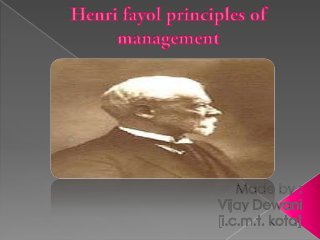
Henri fayol principles of management
- 2. Henri Fayol (Istanbul, 29 July 1841 – Paris, 19 November 1925) was a French mining engineer and director of mines who developed a general theory of business administration. He and his colleagues developed this theory independently of scientific management but roughly contemporaneously. He was one of the most influential contributors to modern concepts of management.
- 4. There are 14 principles : Division of work. This principle is the same as Adam Smith's 'division of labor'. Specialization increases output by making employees more efficient. Authority. Managers must be able to give orders. Authority gives them this right. Note that responsibility arises wherever authority is exercised. Discipline. Employees must obey and respect the rules that govern the organization. Good discipline is the result of effective leadership, a clear understanding between management and workers regarding the organization's rules, and the judicious use of penalties for infractions of the rules.
- 5. Unity of command. Every employee should receive orders from only one superior. like from top to bottom in an organization. Unity of direction. Each group of organizational activities that have the same objective should be directed by one manager using one plan. Subordination of individual interests to the general interest. The interests of any one employee or group of employees should not take precedence over the interests of the organization as a whole.
- 6. Remuneration. Workers must be paid a fair wage for their services. Centralization. Centralization refers to the degree to which subordinates are involved in decision making. Whether decision making is centralized (to management) or decentralized (to subordinates) is a question of proper proportion. The task is to find the optimum degree of centralization for each situation. Scalar chain. The line of authority from top management to the lowest ranks represents the scalar chain. Communications should follow this chain. However, if following the chain creates delays, cross-communications can be allowed if agreed to by all parties and superiors are kept informed.
- 7. Order. People and materials should be in the right place at the right time. Equity. Managers should be kind and fair to their subordinates. Stability of tenure of personnel. High employee turnover is inefficient. Management should provide orderly personnel planning and ensure that replacements are available to fill vacancies.
- 8. Initiative. Employees who are allowed to originate and carry out plans will exert high levels of effort. Esprit de corps. Promoting team spirit will build harmony and unity within the organization. Fayol's work has stood the test of time and has been shown to be relevant and appropriate to contemporary management
